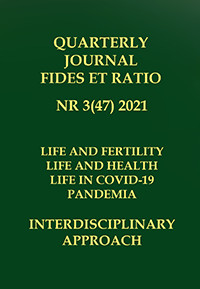Abstract
Introduction: The definition of motherhood is manifold. The responsibilities of motherhood should be considered biologically, psychologically and socially. Conscious motherhood is characterized amongst others by the responsibility of parents for procreative decisions, care for the health, development and safety of the child. In Poland, the model of a woman as mother, who dedicates her life to birthing and raising her offspring, dominates. This has a huge impact on the future functioning of the offspring as citizens of Poland.
Materials and method: Study was conducted through a diagnostic survey in a group of 365 women (284 of which are mothers of three or more children, the remaining 81 being mothers of one child). A self-developed survey containing 29 multiple choice questions with a single correct response as well as a standardized assessment tool SWLS- Life Satisfaction Scale E. Diener, R.A. Emmons, R.J. Larson, S. Griffin (adaptation: Z. Juczyński) were used as a research tool.
Results: The vast majority of respondents are satisfied with their role as mother (97.1%). Many of the women do not plan to have more children (44.1%). In the respondents' opinion, childbirth is a social privilege of a woman (p<0.05). Mothers of more than one child have definitively declared that having multiple children does not decrease the quality of life of women, is a source of life satisfaction, aids in the fulfillment of societal roles and does not impede professional development (p<0.05). A constant partner, religious beliefs and relations with other women having more than two children are important factors for respondents when deciding to expand their family (p<0.05). Women who have given birth to three or more children have greater life satisfaction as compared to mothers of a single child (p<0.05).
Conclusion: Women are happy to be mothers. Motherhood is not a factor hindering their social and private functioning. Women's procreative decisions are influenced by fixed income, formal relationships and religious beliefs. Mothers of large families have greater life satisfaction in comparison to mothers of one child who do not desire more children.
References
Bartkowiak, E. (2015). Obraz matki i macierzyństwa w przekazach źródłowych z historii wychowania, Wychowanie w Rodzinie, 2, 271–294.
Buber-Ennser, I., Skirbekk, V. (2016). Researchers, religion and childlessness, Journal of Biosocial Science, 48, 391–405.
Centrum Badania Opinii Społecznej, (2013). Komunikat z badań. Postawy prokreacyjne Polaków, Available at [13/06/2021].
Duszczyk, M., Fihel, A., Kiełkowska, M., Kordasiewicz, A., Radziwinowiczówna, A. (2014). Analiza kontekstualna i przyczynowa zmian rodziny i dzietności, Ośrodek Badań nad Migracjami, Uniwersytet Warszawski, 2, 22-28.
Dzwonkowska-Godula, K. (2015). Tradycyjnie czy nowocześnie? Wzory macierzyństwa i ojcostwa w Polsce, Wydawnictwo Uniwersytetu Łódzkiego.
Herbst-Debby, A. (2018). Doing good motherhood: Creating their own responsible single mother model, Women’s Studies International Forum, 69, 151–158. https://www.cbos.pl/SPISKOM.POL/2013/K_029_13.PDF.
Lachowska, B., Matuszewska, A., Lachowski, S. (2017). System wartości kobiet a ich postawy wobec macierzyństwa, Kwartalnik Naukowy Fides et Ratio, 1 (29), 67–79.
Machaj-Szczerek, A., Stankowska, I. (2013). Przekonania dotyczące macierzyństwa–badania własne, Pielęgniarstwo Polskie, 3 (49), 176–186.
Malina, A. (2011). Styl przywiązania młodych kobiet, a ich satysfakcja z życia w różnych fazach rozwoju rodziny, Psychologia Rozwojowa, 1, 41–55.
McQuaid, R., Munro, A., Dabir-Alai, P. (2012). Motherhood and its impact on career progression, Gender in Management: An International Journal, 27, 346-364.
Młynarska, M. (2011). Kiedy mieć dziecko? Jakościowe badanie procesu odraczania decyzji o rodzicielstwie, Psychologia Społeczna, 3, 226–240.
Redshaw, M., Martin, C. (2011). Motherhood: a natural progression and a major transition, Journal of Reproductive and Infant Psychology, 29, 305–307.
Sobotka, T., Beaujouan, É. (2018). Late Motherhood in Low-Fertility Countries: Reproductive Intentions, Trends and Consequences. Preventing Age Related Fertility loss, Switzerland: Springer International Publishing, 11–29.
Tataj-Puzyna, U., Bączek, G., Baranowska, B., Doroszewska, A. (2017). Doświadczenie macierzyństwa – badania sondażowe matek w Warszawie, Kwartalnik Naukowy Fides et Ratio, 2 (30), 124–144.
Vasyagina, N.N., Kalimullin, A.M. (2015). Retrospective Analysis of Social and Cultural Meanings of Motherhood in Russia, Review of European Studies, 7, 61.
World Health Organization, (2014). Basic documents. Forty - eighth edition, 1. Available at [13/06/2021]: https://apps.who.int/gb/bd/PDF/bd48/basic-documents-48th-edition-en.pdf

